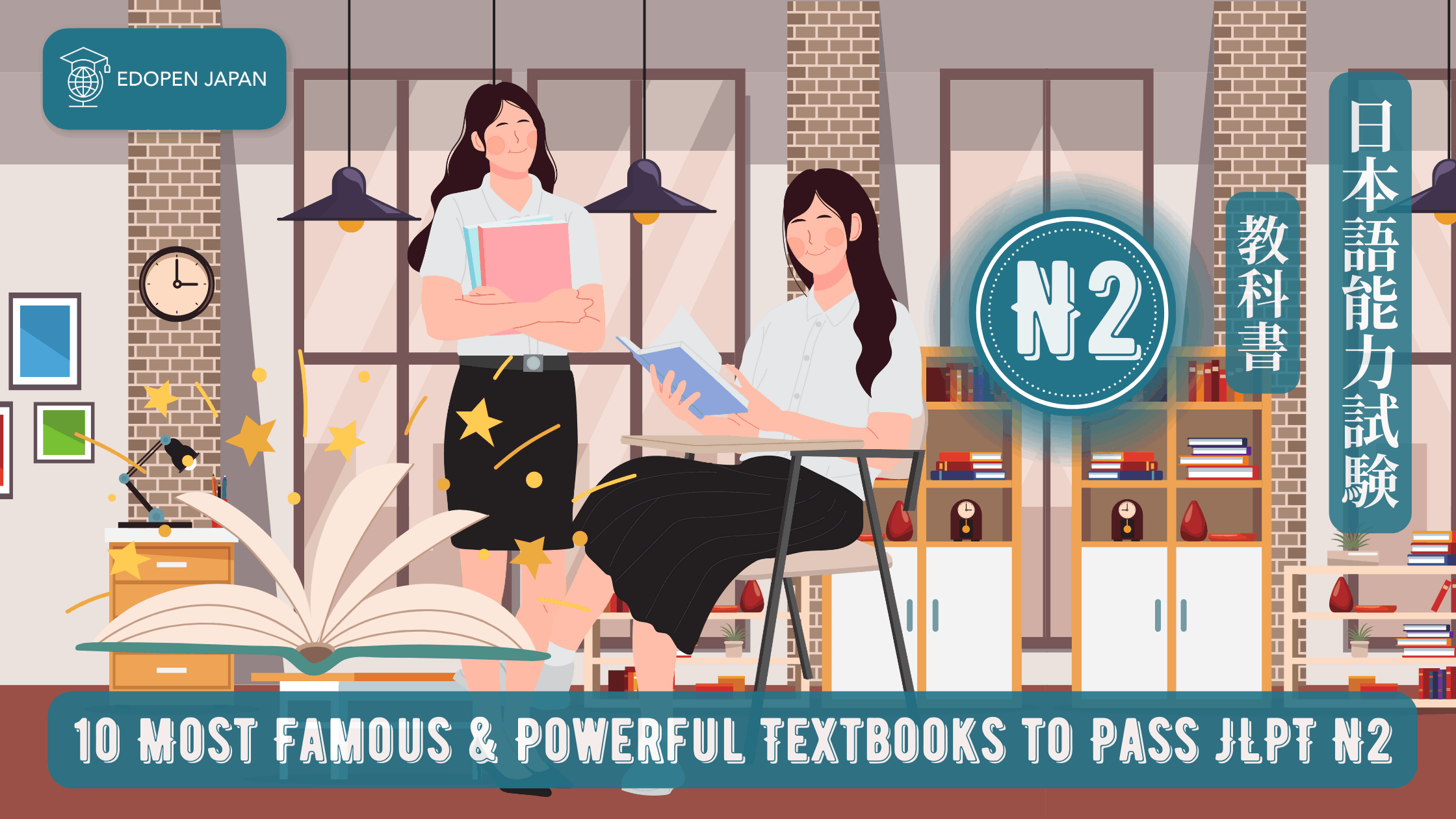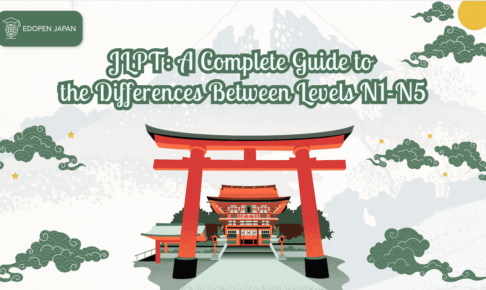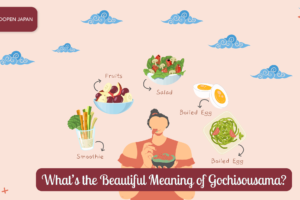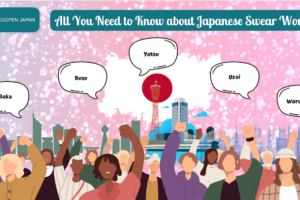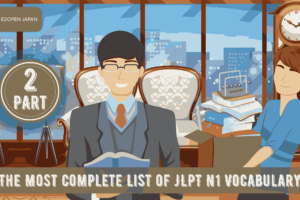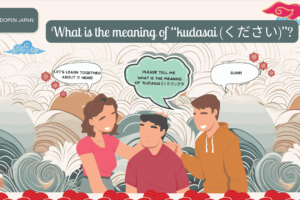JLPT (Japanese Language Proficiency Test or 日本語能力試験) is an authorized examination that assesses the language skills of non-native speakers in Japanese. The assessment is multifaceted and comprises a range of components, including proficiency in comprehending vocabulary and kanji, processing information through reading, and audio receptive abilities.
When it comes to the JLPT N2 exam, selecting the correct book is of utmost importance. To aid in your search for the top books, we’ve compiled a list of the ten most renowned and effective textbooks to pass the JLPT N2. We hope you can read this article to the end to broaden your understanding and knowledge about the JLPT N2.
In addition, please also read the recommended articles below on the vocabulary of the JLPT N2, the JLPT Guide and others, below! After reading this article, we are eager to hear your feedback and thoughts in the comments below. Thank you for taking the time to read, let’s begin!
Read also:
JLPT N2 Vocabulary (Part 1) | The Most Complete Lists
JLPT N2 Vocabulary (Part 2) | The Most Complete Lists
JLPT N2 Vocabulary (Part 3) | The Most Complete Lists
Contents
About JLPT N2
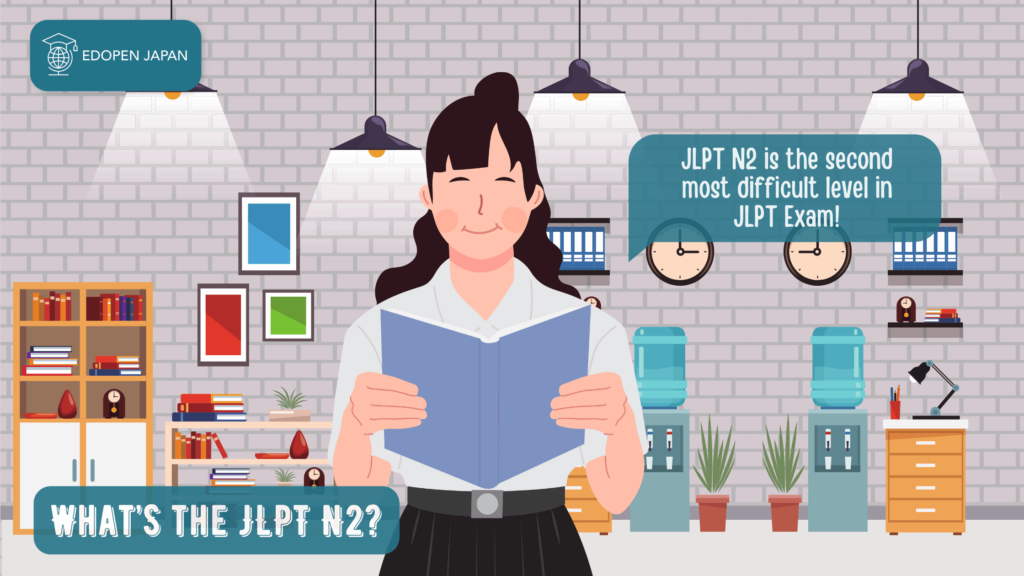
JLPT N2 is the second most difficult level after the most difficult level, JLPT N1. Level N2 tests your understanding of the Japanese language used in real everyday life in a wider range of formal and informal situations. The JLPT N2 also tests learners’ understanding in 5 different areas:
| 1. Grammar (文法/bunpou), Vocabulary (語彙/goi) and Kanji (漢字/kanji). |
| 2. Reading Comprehension (読解力/dokkai ryoku). |
| 3. Listening Comprehension (聴解力 / Chōkai ryoku). |
The JLPT N2 exam consists of the following 2 sections, Language Knowledge & Reading in 105 minutes as well as Listening in 50 minutes.
1. Language Knowledge & Reading (105 minutes)
Each section of the JLPT N2 exam has specific components that are tested. In particular, vocabulary, grammar and reading skills are the focus of this section. Please refer to the table below for more details:
| Language Knowledge & Reading | |
| (Vocabulary) | |
| 1. Kanji reading | Test reading of the words written in kanji. |
| 2. Orthography | Test kanji for words written in Hiragana. |
| 3. Word formation | Test knowledge of derived and compound words. |
| 4. Contextually-defined expressions | Test the words whose meaning is derived from the context. |
| 5. Paraphrases | Test the words and phrases with similar meanings. |
| 6. Usage | Test the use of words in sentences. |
| (Grammar) | |
| 1. Sentential grammar 1 (selecting grammar form) | Examine judgment of sentence-appropriate grammatical formats. |
| 2. Sentential grammar 2 (sentence composition) | Examine syntactically correct and meaningful sentence composition. |
| 3. Text grammar | Examine judgment of suitability of sentences for text flow. |
| (Reading Comprehension) | |
| 1. Comprehension (short passages) | Test comprehension of the content by reading text of about 200 characters, such as descriptions and instructions on various topics, including everyday life and work. |
| 2. Comprehension (mid-size passages) | Check the author’s understanding of causal relationships, rationales, outlines, or ideas by reading a text of about 500 characters, such as relatively simple reviews, commentaries, and essays. |
| 3. Integrated comprehension | Test your understanding by comparison and integration by reading several relatively simple texts (about 600 characters in all) |
| 4. Thematic comprehension (long passages) | Test of ability to grasp the totality of intended points and ideas by reading a text of about 900 characters, e.g., reviews with relatively clear logical development. |
| 5. Information retrieval | Test of ability to extract necessary information from materials such as advertisements, brochures, magazines, and business documents (approximately 700 characters). |
2. Listening (50 minutes)
As far as the session of the listening skills test is concerned, there are 5 items that will be tested as follows:
| 1. Task-based comprehension | Test comprehension of content by listening to a connected text (test ability to extract necessary information to solve specific problems and understand appropriate action). |
| 2. Comprehension of key points | Test comprehension of content by listening to a connected text (test ability to narrow down points based on necessary information presented in advance). |
| 3. Comprehension of general outline | Test understanding of content by listening to a connected text (test understanding of the speaker’s intent and ideas from the overall text). |
| 4. Quick response | Test the ability to select appropriate answers by listening to short utterances such as questions. |
| 5. Integrated comprehension | Test comprehension of content by comparing and integrating multiple sources of information by listening to a relatively long text |
Practice JLPT N2 Exam with Complete Set Textbooks
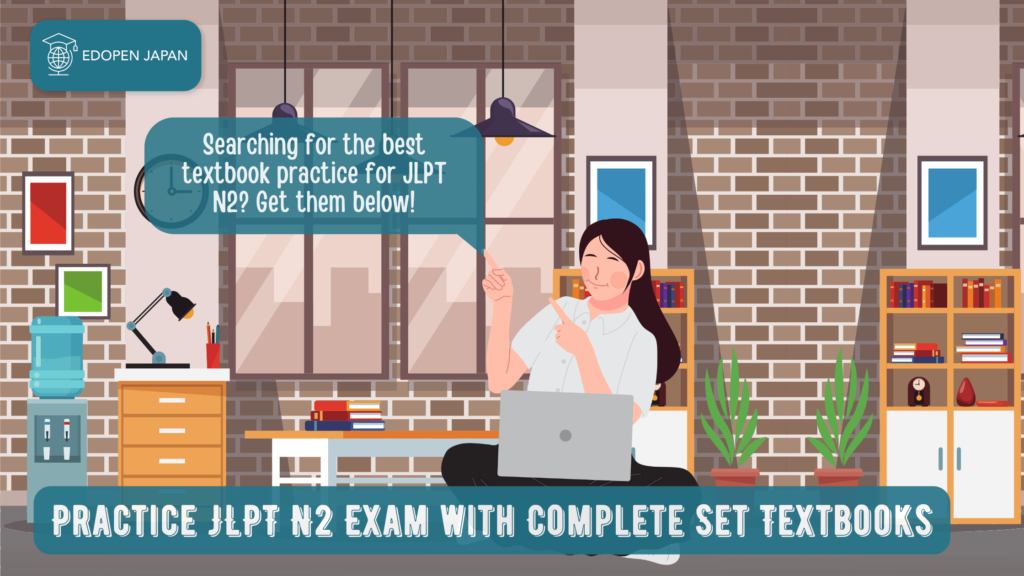
When preparing for the JLPT N2, it is very important to practice answering questions and become familiar with the exam questions. The more questions and Japanese-specific material you learn, the better your chances of passing the JLPT N2 with ease.
It is therefore important to choose a book that meets all these requirements. For this reason, in this article we are going to introduce you to a number of complete sets of books that cover everything you need to know to pass the JLPT N2.
Simply choose one of these complete sets of books and start practising! They are all different, so just adapt to your budget and the content you need.
1. New Kanzen Master JLPT N2

New Kanzen Master is one of the top-ranked complete set books for Japanese language preparation. In 1 complete set you get 5 books, as follows:
| 1. New Kanzen Master JLPT N2 (Grammar) | Discusses language structures, practice questions, how to make sentences, construct sentences according to context and mock tests exactly like the JLPT exam. |
| 2. New Kanzen Master JLPT N2 (Kanji) | Covers all the kanji and vocabulary needed to pass JLPT N2 by explaining how to write and read them. There are 53 lessons specifically set to be completed in 53 days. |
| 3. New Kanzen Master JLPT N2 (Listening Comprehension) | Discusses various questions and comprehensive explanations for understanding JLPT N2 level listening competency questions. |
| 4. New Kanzen Master JLPT N2 (Vocabulary) | Features 999 questions on vocabulary that has a high chance of appearing in the JLPT N2 exam. |
| 5. New Kanzen Master JLPT N2 (Reading Comprehension) | Reviews and explains in great detail how to understand sentence structures, topics and find specific information in texts with vocabulary and patterns similar to the actual JLPT N2 exam. |
2. Nihongo So-Matome JLPT N2

The second set of textbooks we recommend for your list is Nihongo So-Matome JLPT N2. The most interesting thing about Nihongo So-Matome is that the topics are specially designed to be learnt in 4 weeks and are cute illustrated. In 1 complete set, you will receive 5 books in the following:
| 1. Nihongo So-Matome JLPT N2 Grammar | Discusses all the grammar items that have a high potential to appear in the JLPT N2 exam and detailed explanations of their use. |
| 2. Nihongo So-Matome JLPT N2 Kanji | Comprehensively covers all the kanji in JLPT N2 level and is specially designed for 8 weeks of intensive study. |
| 3. Nihongo So-matome JLPT N2 – Reading Comprehension | Discuss texts on specific topics designed to be studied in 1 week. There are practice questions for each text that are very diverse and have the potential to appear in JLPt N2 exam questions. |
| 4. Nihongo So-matome JLPT N2 Vocabulary | Covers 1,400 vocabulary words at JLPT N2 level. The vocabulary is organized by related topics. Very comprehensive with practice questions just like the real JLPT N2 exam. |
| 5. Nihongo So-matome JLPT N2 – Listening Comprehension | Discusses in great detail various questions that can be used to sharpen listening comprehension. Includes explanations of frequently used grammar points and patterns. As well as extensive practice questions. |
3. JLPT Preparation Book Speed Master N2

For the third option, we recommend the JLPT Preparation Book Speed Master – Quick Mastery of N2. In a complete set you get 4 books with 1 additional book of 2500 intermediate vocabulary if you need it. The books are the following:
| 1. JLPT Preparation Book Speed Master – Quick Mastery of N2 Grammar |
| 2. JLPT Preparation Book Speed Master – Quick Mastery of N2 Vocabulary |
| 3. JLPT Preparation Book Speed Master – Quick Mastery of N2 Reading |
| 4. JLPT Preparation Book Speed Master – Quick Mastery of N2 Listening |
| 5. JLPT Preparation Book Speed Master – Quick Mastery of N2 Vocabulary (Intermediate 2500) |
Unlike other books, the concept of this book is unique in that it is divided into 3 sections, ‘Warm-up’, ‘Practice’ and ‘Mock Test’, which cover all the material commonly used for JLPT N2 test preparation. The ‘Warm-up’ section discusses material concepts to build a basic understanding of the topics covered, such as grammar, vocabulary and more.
Then the ‘Practice’ section tests your understanding and application of the topics covered. Finally, the ‘Mock Test’ section tests you with questions similar to the actual JLPT N2 exam to see if you are ready for the JLPT N2 exam.
4. Drill and Drill JLPT N2

The next book, Drill and Drill JLPT N2 complete set, is very compact. This is because it consists of only 3 books in 1 complete set. The strength of this book is the very large number of questions. It is suitable for you to practice time management and familiarize yourself with the JLPT N2 exam.
This book also provides very comprehensive answers and explanations, so it really helps JLPT N2 fighters to get good scores and a deep understanding of Japanese. In 1 complete set, there are 3 types of books as follows:
| 1. Drill and Drill JLPT N2 Grammar. |
| 2. Drill and Drill JLPT N2 Vocabulary. |
| 3. Drill and Drill JLPT N2 Listening and Reading. |
5. Nihongo Power Drill N2

The complete set of “Nihongo Power Drill N2” books is also very compact. It consists of only 2 books, but it covers a lot of questions. Nihongo Power Drill N2 is a workbook that is often used by JLPT N2 fighters to increase their power to conquer JLPT N2 questions quickly and accurately. In 1 set, you will receive 2 books in the following:
| 1. Nihongo Power Drill – N2 Grammar | Discusses 30 lessons with 580 questions with 100 questions that focus on building the strength of your mastery of N2 Japanese grammar. |
| 2. Nihongo Power Drill – N2 Vocabulary | Covers 30 lessons with 640 questions. Where 540 questions focus on N2-like questions and 100 questions focus on strengthening your understanding of N2-level Japanese vocabulary. |
6. The Preparatory Course for JLPT N2

The 6th book we would like to introduce is called “The Preparation Course for the JLPT N2”. In the complete set you will get 3 types of books as follows:
| 1. The Preparatory Course for the JLPT N2 – Grammar, Kanji, and Vocabulary. |
| 2. The Preparatory Course for the JLPT N2 – Reading Comprehension & Grammar. |
| 3. The Preparatory Course for the JLPT N2 – Listening. |
Using this book, you will be able to understand ‘sentence structure’ with more focus because each question is explained in groups according to its type, whether it is a noun, verb, adjective or other. This will help you to understand the meaning of the sentence correctly. There are lots of conversation examples in the questions. This will also help you improve your verbal Japanese.
Extra Textbooks for JLPT N2 Grammar Drill
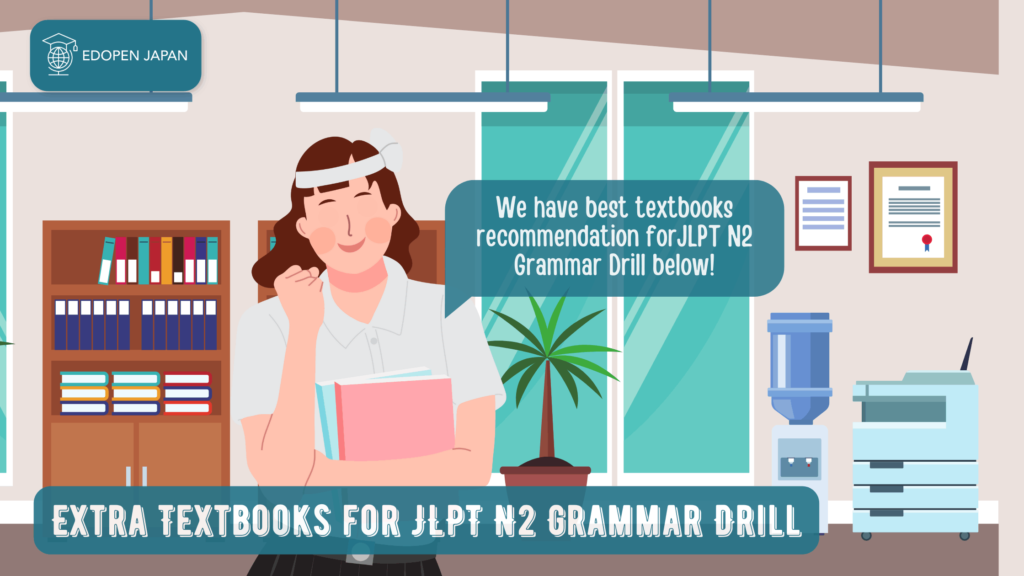
To pass the JLPT N2 grammar exam, you must have a minimum of around 200 points of Japanese grammar. This grammar covers topics related to everyday life. To support the full set of books above, the additional 2 books and dictionaries below can also be added to your list. Please read the detailed information below.
1. Tobira Grammar Power: Exercises for Mastery

If you’re using a Tobira Gateway book, then Tobira Grammar Power: Exercises for Mastery is one to consider for improving grammar at the N2 level. Consisting of 15 chapters with 10-15 pages of exercises in each chapter, it helps you focus on practising your understanding of Japanese grammar for N2 and N3 levels.
The concept of material discussion is also very good, consisting of 3 components, foundation, application and expansion. This concept gives you a strong and in-depth learning system. It is suitable for you if you want to learn sequentially and in detail.
2. A Handbook of Japanese Grammar Patterns for Learners and Teachers

A Handbook of Japanese Grammar Patterns for Learners and Teachers is perfect for those of you who want a comprehensive handbook that you can also use to understand N2 and N1 level Japanese grammar. There are almost 3000 grammar elements, arranged in a sequence with a variety of sources and media formats.
It also provides examples of correct usage, sentence structures and patterns, and situations in which grammar is practised. We highly recommend this guide to deepen your understanding of advanced Japanese grammar.
Extra Textbooks for JLPT N2 Kanji and Vocabulary Drill
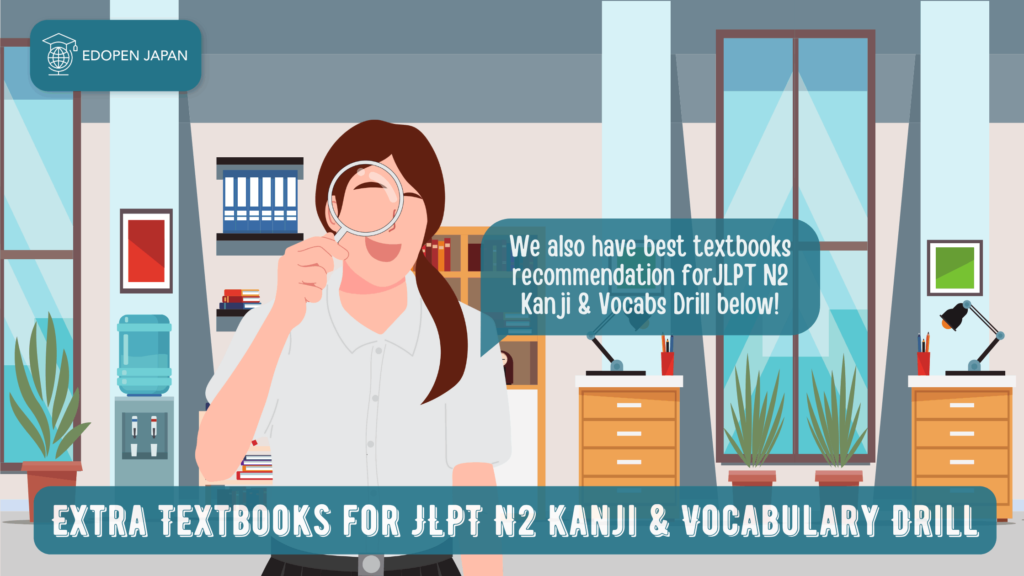
In total, to pass the JLPT N2, you will need to know approximately 1000 kanji and 6000 Japanese vocabulary words. If you’ve already passed the previous JLPT level, it covers everything. So you just need to add the kanji and vocabulary you already have in this N2 level.
The key to mastering kanji and vocabulary is practice and lots of reading! In addition to the complete set of books described above, you should also consider the following 2 books if you really want to master JLPT N2. Therefore, not only will you be able to pass the JLPT exam, but you will also be able to achieve a perfect score
1. 550 Essential Kanji for the JLPT N2

The more kanji you know, the better your chances of passing the JLPT N2. Therefore, we would like to recommend a comprehensive book that covers the 550 kanji required for the JLPT N2. This book is called 550 Essential Kanji for the JLPT N2.
Not only do you get 550 kanji, but you also get an extra 2250 words for each of the 550 kanji. With English and Vietnamese translations. These are all vocabulary words that have a high probability of appearing on the actual JLPT N2 exam. Highly recommended!
2. 2500 Essential Vocabulary for the JLPT N2

This 2500 Essential Vocabulary for JLPT N2 book is for you if you are a visual person and want to expand your vocabulary with easy concepts. This book provides an easy way to master Japanese vocabulary intelligently, organised in a consistent, clear format according to the topics covered.
There are also example sentences and translations in English and Vietnamese. You’ll also be given red sheets to test your ability to check and guess the missing words in the example sentences. Last but not least, the illustrations are also very funny, which makes learning JLPT N2 vocabulary interesting and not boring.
Conclusion
Finally, we’d like to ask you to check the 10 most famous textbooks for passing JLPT N2 above.
| Practice JLPT N2 Exam with Complete Set Textbooks | 1. New Kanzen Master JLPT N2 2. Nihongo So-Matome JLPT N2 3. JLPT Preparation Book Speed Master N2 4. Drill and Drill JLPT N2 5. Nihongo Power Drill N2 6. The Preparatory Course for JLPT N2 |
| Extra Textbooks for Grammar Drill | 1. Tobira Grammar Power: Exercises for Mastery 2. A Handbook of Japanese Grammar Patterns for Learners and Teachers |
| Extra Textbooks for Kanji and Vocabulary Drill | 1. 550 Essential Kanji for the JLPT N2 2. 2500 Essential Vocabulary for the JLPT N2 |
We also welcome any comments and suggestions for improvement. We wish you success in passing the JLPT N2!

